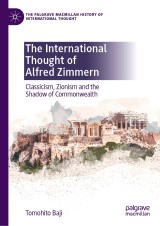Details

The International Thought of Alfred Zimmern
Classicism, Zionism and the Shadow of CommonwealthThe Palgrave Macmillan History of International Thought
|
CHF 130.00 |
|
| Verlag: | Palgrave Macmillan |
| Format: | |
| Veröffentl.: | 11.03.2021 |
| ISBN/EAN: | 9783030662141 |
| Sprache: | englisch |
Dieses eBook enthält ein Wasserzeichen.
Beschreibungen
<div><p>This book is a comprehensive examination into the shifting international thought of Alfred Zimmern, a Grecophile intellectual, one of the most prominent liberal internationalists and the world’s first professor of IR. Identifying the writings of Burke and cultural Zionism as two important ideological sources that defined his project for empire and global order, this book argues that Zimmern can best be understood as an apostle of Commonwealth. It shows that while his proposals changed from cosmopolitan democracy to Euro-Atlanticism and to world federal government, they were constantly shaped by the organizing principles of a professedly universal British Commonwealth. It was the empire transhistorically chained to classical Athens.<br></p></div>
Chapter 1. An Apostle of Commonwealth: Introduction.- Chapter 2. Empire and Classical Republicanism.- Chapter 3. Zionist Internationalism.- Chapter 4. A Turn: From Global Reformism to Euro-Atlanticism.- Chapter 5. Nuclear One-Worldism.- Chapter 6. Postscript. <div></div>
<p><b>Tomohito Baji</b> is Associate Professor in the History of Political and Social Thought at the Graduate School of Arts and Sciences, the University of Tokyo, Japan. His articles have appeared in <i>Modern Intellectual History</i> and the <i>History of European Ideas</i> as well as the several journals of Japanese academic associations.</p>
<p>This book is a comprehensive examination into the shifting international thought of Alfred Zimmern, a Grecophile intellectual, one of the most prominent liberal internationalists and the world’s first professor of IR. Identifying the writings of Burke and cultural Zionism as two important ideological sources that defined his project for empire and global order, this book argues that Zimmern can best be understood as an apostle of Commonwealth. It shows that while his proposals changed from cosmopolitan democracy to Euro-Atlanticism and to world federal government, they were constantly shaped by the organizing principles of a professedly universal British Commonwealth. It was the empire transhistorically chained to classical Athens.<br></p>
<p><b>Tomohito Baji</b> is Associate Professor in the History of Political and Social Thought at the Graduate School of Arts and Sciences, the University of Tokyo, Japan.</p>
<p><b>Tomohito Baji</b> is Associate Professor in the History of Political and Social Thought at the Graduate School of Arts and Sciences, the University of Tokyo, Japan.</p>
Offers an intellectual biography of Zimmern by examining the entire development of his thought in the first half of the twentieth century Utilizes source material from British, American and French archives as well as the bulk of Zimmern’s published writings Shows the distinctive ways in which Zimmern combined diverse and disparate ideological sources, including Edmund Burke, Ahad Ha’am, Horace Kellen, St. Augustine and Henri Bergson Highlights the unique features of Zimmern’s ideas vis-à-vis other key British internationalists such as J.A. Hobson and Lionel Curtis as well as important IR thinkers like Hans Morgenthau
<p>“Baji’s work is a well written study into one of the early practitioners of International Relations. As the discipline faces its own imperial past, it is necessary to look again at these early figures. These were men who had complex relationships with imperialism, racial hierarchy, democracy, liberalism and the discipline’s self-anointed mission of establishing world peace. Through Baji’s study on Alfred Zimmern we can see how these influences intermingled, contradicted each other and informed the first years of the discipline. For anyone interested in the early years of International Relations or interwar politics this book is a vital resource.” (Benjamin Whitlock, University of Aberdeen, Scotland, in The Round Table)</p><p>“In this excellent book, Tomohito Baji offers a comprehensive and original account of Alfred Zimmern's political thought. Baji ranges widely, covering all phases of Zimmern's extraordinary career, and demonstrating the thread of continuity running through his influential work on ancient history, his contributions to IR, and his arguments about religion, empire, race, citizenship, and the nature of political community. Erudite and insightful, this is an admirable contribution to the history of international thought.” (Duncan Bell, Professor in the Department of Politics and International Studies, University of Cambridge, UK)</p>
<p>“Alfred E. Zimmern was one of the most important international thinkers of the twentieth century – and one of the most far-ranging. Trained as a classicist, he became an advocate for both the Commonwealth of Nations and Zionism, a prominent internationalist, and a designer of a proposed global constitution. This perceptive book analyses the underpinnings and evolution of Zimmern’s ideas, drawing deeply on his published work and his papers.” (Ian Hall, Professor of International Relations, Griffith Asia Institute, Australia)</p><div><p></p></div>
<p>“Alfred E. Zimmern was one of the most important international thinkers of the twentieth century – and one of the most far-ranging. Trained as a classicist, he became an advocate for both the Commonwealth of Nations and Zionism, a prominent internationalist, and a designer of a proposed global constitution. This perceptive book analyses the underpinnings and evolution of Zimmern’s ideas, drawing deeply on his published work and his papers.” (Ian Hall, Professor of International Relations, Griffith Asia Institute, Australia)</p><div><p></p></div>
Diese Produkte könnten Sie auch interessieren:

Inclusión educativa de niños, niñas y adolescentes migrantes venezolanos, en Colombia

von: Douglas Jiménez

CHF 16.00
















